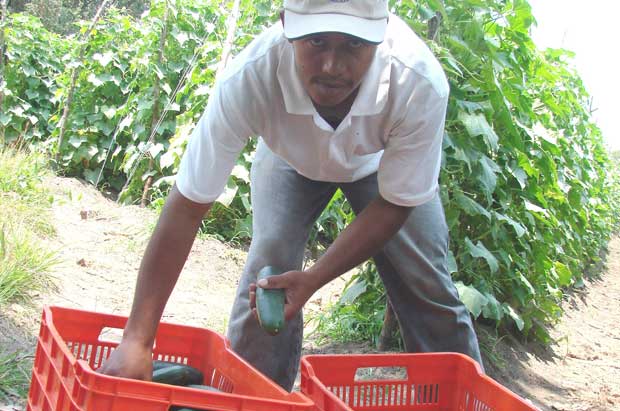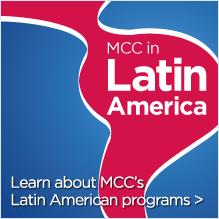-

The US Government’s Millennium Challenge Corporation (MCC) is based on the principle that aid is most effective when it reinforces good governance, economic freedom and investing in people.
MCC partners with six Latin American countries to develop and implement threshold and compact programs that will improve the lives of the poor through economic growth. Take a look at some important events that took place in three MCC-funded programs in Latin America in 2008. -

Comayagua, Honduras: Under the MCC funded Rural Development project in Honduras, over 3,400 farmers have cultivated more than 4,900 hectares of high value horticulture crops. The farmers received technical assistance and training in small business skills and best agricultural practices. Thanks to this training, farmers are planting high value crops such as watermelon, cucumber and onions and experiencing significant increases in income. Under the access to credit activity, as of October 29, 2008, over 650 loans have been issued to farmers of which 46% are women.
MCA-Honduras
-

CA-5 Road: MCA-Honduras is making history by conducting the most comprehensive application of an equitable policy for resettlement. A legislative measure developed by MCA-Honduras and passed by the Honduran Congress enabled the prompt and equitable compensation of people to be relocated as a result of the works associated with the Transportation Project. Many of those who are receiving compensation now have access to homes with improved services, and many others will receive better and safer premises for their roadside businesses.
MCA-Honduras
-

Las Gradas, Comayagua Honduras: Modesta Rodríguez Ramírez is one of the women who will be relocated under the MCA-Honduras resettlement effort. In anticipation of the MCA improvements to the CA-5 highway, Modesta was consulted and offered different compensation and resettlement options. She decided it was best for her to relocate her home and business which will now be in a more secure location, in close proximity to where she lives, and will have access to basic services she currently lacks such as potable water. She will also receive business services support to improve her sales and products.
MCA-Honduras
-

Ajuterique, Comayagua Honduras: On July 30, 2008, four local mayors organized a ceremony commemorating the start of the works for the long-awaited project to pave the Comayagua-Ajuterique-Lejamaní-La Paz road. “We have been waiting many years for this project, and thanks to the resources provided by the US Government, it will now become a reality,” expressed Mr. Roberto Micheletti, President of the National Congress of Honduras. In the picture, Jonathan Brooks, the MCC Honduras Resident Country Director, receives the award granted by the mayors in recognition of the work and support provided through MCC funds.
MCA-Honduras
-

Ciudad del Este, Paraguay: Paraguay’s $34.65 million MCC threshold program is creating conditions conducive to economic growth and business development. Ciudad del Este is the third largest tax-free commercial zone in the world and contraband passes through border and customs controls using different modalities. This picture depicts what is referred to locally as “Ant Smuggling,” the method in which many products are smuggled between Paraguay and Brazil. The MCC threshold program supports a customs enforcement unit called DETAVE to stop contraband by strengthening border and customs controls.
USAID
-

Rio Paraguay, Paraguay: Pictured above is DETAVE, the anti-contraband unit in charge of combating drug trafficking, patrolling the Rio Paraguay. MCC support helped customs enforcement units in Paraguay seize over $6 million worth of contraband goods in less than one year of operation. The MCC threshold program is strengthening border and customs controls by patrolling land and river borders, and monitoring goods transported within national borders, improving investment conditions that will spur economic growth.
USAID Paraguay
-

Ciudad del Este, Paraguay: The MCC threshold program in Paraguay is building a transparent business environment by promoting investments that create businesses in the tri-border area where Brazil, Argentina and Paraguay meet. MCC's support helped Paraguay attract 32 new businesses, promoting formal economic activity that will create approximately 4,000 jobs. One of these businesses is Vantex S.A. and they have trained and hired more than 150 people to work in its factory.
USAID Paraguay
-

San Salvador, El Salvador: On September 30, 2008, the MCC-funded expansion of the “Peace Route” was launched, an initiative of the Tourism Development Program of Morazán (PRODETUR). The Peace Route is a pillar of local economic development for the residents of northern Morazán, an area which suffered serious damage during El Salvador’s civil war in the 80’s. MCC investments are enabling PRODETUR to train local hotel staff and restaurant owners as well as to develop new tourism promotion and marketing materials to showcase the natural beauty, cultural richness, and historic significance of this impoverished area.
FOMILENIO
-

Metapan, El Salvador: Jorge Alberto Solas, pictured above with one of his children, is one of the first beneficiaries of a MCC-funded pilot project working to promote high-value fruit tree crops. The project, managed by the Institute for Inter-American Cooperation for Agriculture (IICA), is providing valuable technical assistance, seedlings and marketing strategies for beneficiaries across the northern zone. As of September 2008, Jorge and his family are pushing ahead with their plans of diversified production on their small parcel of land, receiving tangerine trees and the technical assistance necessary for ensuring a successful transition.
FOMILENIO
-

In an effort to generate greater interest by US and other international companies in MCC investments in the region, FOMILENIO conducted a major outreach event in October, 2008. This event clarified MCC’s procurement process and the requirements needed to bid on upcoming contracts. At the event, Jose Calderón, FOMILENIO’s Connectivity Project Coordinator, stated that “as a result of the resources provided by MCC, this investment will cut the current travel time from Metapan to Chalatenango from 3 hours to only 45 minutes – saving time, but even more important, reducing transportation costs.”
FOMILENIO
-

As the MCC-funded compact gathers momentum in implementation, FOMILENIO opened the first two of its regional offices in Metapan and Nueva Concepcion. These regional offices provide closer relationships with the community of beneficiaries in the northern zone and strategic outposts for crucial work on implementing the Resettlement Action Plan, a prerequisite for all future construction activities related to the Connectivity Project.
FOMILENIO



